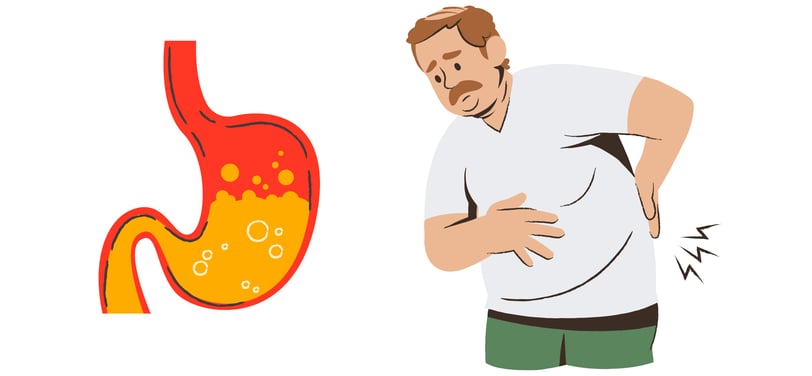The Role of Diet in Gas and Bloating: Foods to Avoid and Foods to Incorporate
Discover how diet plays a crucial role in gas and bloating issues. Improve your understanding of the impact of diet on gas-related discomfort and find practical tips for alleviating bloating.
NUTRITION AND HEALTHY EATING
7/15/20233 min read


Introduction:
Gas and bloating are common digestive issues that can cause discomfort and affect our daily lives. While several factors contribute to these problems, diet plays a significant role. Certain foods can contribute to excessive gas production, while others can help alleviate bloating. In this article, we will explore the role of diet in gas and bloating, highlighting foods to avoid and foods to incorporate for a healthier digestive system.
Avoid Carbonated Drinks: Carbonated drinks, such as soda and sparkling water, release carbon dioxide gas, which can lead to bloating. Avoiding or minimizing the consumption of carbonated beverages can help reduce gas production and alleviate bloating.
Limit Cruciferous Vegetables: Cruciferous vegetables like broccoli, cauliflower, cabbage, and Brussels sprouts are highly nutritious but can cause gas and bloating. These vegetables contain sugars that are not easily digested, leading to increased gas production. Cook them thoroughly or try alternative cooking methods like steaming to make them easier to digest.
Watch Out for Legumes: Legumes such as beans, lentils, and chickpeas are excellent sources of protein and fiber but can cause gas and bloating. Soaking legumes overnight and rinsing them before cooking can help reduce their gas-producing properties. Gradually increase your intake of legumes to allow your body to adjust and minimize digestive discomfort.
Limit High-Fiber Foods: While fiber is essential for a healthy digestive system, consuming too much fiber too quickly can cause excessive gas. High-fiber foods like whole grains, bran, and certain fruits and vegetables can contribute to bloating. Gradually increase your fiber intake and drink plenty of water to aid digestion and minimize gas production.
Reduce Fatty Foods: Fatty foods take longer to digest, which can lead to a feeling of fullness and bloating. Fried foods, greasy snacks, and fatty cuts of meat should be consumed in moderation. Opt for lean protein sources, such as skinless poultry, fish, and tofu, and choose healthier cooking methods like grilling or baking.
Be Mindful of Dairy Products: Some individuals may have lactose intolerance, which means their bodies have difficulty digesting lactose, the sugar found in dairy products. This can lead to gas, bloating, and other digestive discomforts. If you suspect lactose intolerance, try lactose-free alternatives or consider dairy substitutes like almond milk or soy-based products.
Incorporate Ginger: Ginger has long been used to aid digestion and reduce gas and bloating. It contains compounds that soothe the digestive system and promote proper digestion. Add fresh ginger to meals, sip on ginger tea, or take ginger supplements to alleviate gas and bloating.
Embrace Probiotics: Probiotics are beneficial bacteria that promote a healthy gut and aid digestion. Foods like yogurt, kefir, sauerkraut, and kimchi are rich in probiotics and can help reduce gas and bloating. Consider incorporating these probiotic-rich foods into your diet for improved digestive health.
Opt for Low-FODMAP Foods: FODMAPs (fermentable oligosaccharides, disaccharides, monosaccharides, and polyols) are a group of carbohydrates that can cause digestive issues, including gas and bloating, in some individuals. Low-FODMAP foods include rice, quinoa, bananas, blueberries, and spinach. Consult with a healthcare professional or a registered dietitian to explore a low-FODMAP diet if you suspect FODMAP intolerance.
Stay Hydrated and Practice Mindful Eating: Drinking an adequate amount of water throughout the day can help maintain regular bowel movements and prevent constipation, which can contribute to gas and bloating. Additionally, practicing mindful eating, chewing food thoroughly, and eating slowly can aid digestion and reduce the likelihood of swallowing excess air.
Conclusion: By paying attention to your diet and making informed choices, you can significantly reduce gas and bloating. Avoiding carbonated drinks, limiting certain vegetables and legumes, and moderating fatty and high-fiber foods can help alleviate gas-related discomfort. Incorporating ginger, probiotics, and low-FODMAP foods into your diet can promote a healthier digestive system. Remember to listen to your body, stay hydrated, and adopt mindful eating habits for optimal digestive health. Consult with a healthcare professional or a registered dietitian for personalized guidance based on your specific needs.
Location
Nagpur, Maharashtra, India
Hours
Mon-Sat 9:00-18:00
Sun Closed
Contact
whitelanehealthcare@gmail.com


